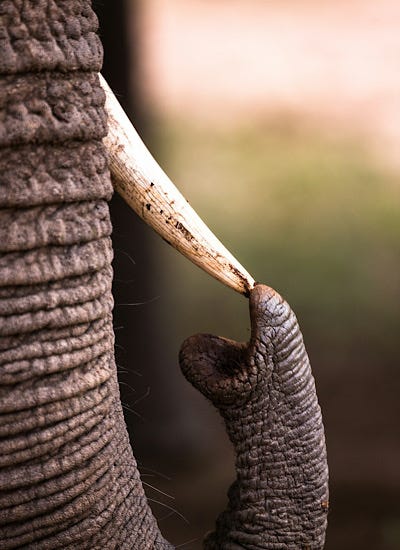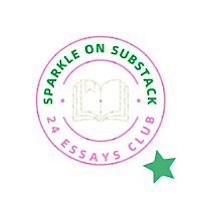If you had to describe an elephant by its physical features, what would you say? I bet their tusks would be one of the first things you’d think of, along with their long trunks, gigantic ears, and their massive size.
Elephant tusks are one of their defining features. And they need them. Tusks are used to dig for and to gather food, to mark or strip bark from trees, and of course, for self-protection. These are all pretty necessary for the survival of an elephant. But sadly, the value of these beautiful and functional appendages is seen by certain humans as a commodity to be taken and used for their own profit, rather than as the essential, life sustaining things that they are. Poachers take them because they can — and the price is paid by the lives of these animals.
And if that weren’t awful enough, I recently read something that was so horrible I didn’t think it could be true. On the one hand, this fact is a wonderful example of just how adaptive and resilient living creatures can be. On the other hand, it highlights the sad reality of the opposite end of that same spectrum — human nature’s capacity for ugliness.
This is what I read: In order to protect themselves from poachers, African elephants have been evolving without tusks.1 Yes, you read that right. In order to protect themselves from poachers, African elephants have been evolving without tusks.
These animals’ genetic makeup has slowly been changing over time, not because these impressive parts of their bodies serve no purpose. No, on the contrary. Tusks serve a purpose to the lives of elephants, and yet they’re becoming a liability because they are so coveted by humans. What an awful catch-22. The animals who possess tusks are not surviving and so they are being pruned from the elephant population. It’s a sad and horrible truth. And it made me realize something — we humans do this to each other too.
When we’re young, and throughout our lives, we figure out which of our behaviours are acceptable to others and which ones are not through trial and error. We try things out. We get feedback. We repeat behaviours that elicit positive reactions. We stifle those that don’t. When we smile, when we are agreeable, we are met with positive reactions from the people around us. Even from the time we were babies, we mimicked the smiles of our parents and we got more in return, with warm cuddles and soft voices — all positive reinforcement. Conversely, when we exhibit less favourable behaviours, we are met with negative feedback, or worse — we’re ignored. We learn to change those behaviours. We adapt. From the moment we begin to interact with other children in social settings, the children let us know pretty quickly what behaviours they are and aren’t willing to accept. And to us ultra-social creatures, this acceptance is paramount. And so it is in this way that we adapt.
This socialization process continues to happen to us throughout our lives. It can be useful, I suppose, if it helps us get along in our particular communities — and if we are not fundamentally changing who we are. But these adaptive behaviours can be insidious. And they can be damaging if we’re not aware that we’re doing them. If we let this self-pruning go too far, we can lose sight of who we really are. We can start to stuff down parts of ourselves without even realizing it to suit other people, until we’ve become a shell of our former selves, our true selves.
Sometimes we have to do this in order to survive. Like the elephants who’ve evolved to avoid being preyed on by poachers, so too do we begin to morph. It doesn’t happen over generations like it’s been happening with the elephants. It can take only a few years, or even months. It can happen during the course of a particularly toxic relationship.
I recognized this unhealthy-yet-seemingly-necessary survival strategy when reading
’s essay, Weathering the Storm. She tells us how she had to continually adjust her behaviour in order to avoid the abuse of her husband, whose own behaviour was often irrational, erratic, and unpredictable. Over time, and without realizing it, she lost sight of who she was. She had whittled herself down to someone she no longer recognized. Unfortunately, so many people, especially women, find themselves in this situation. This was made clear by the overwhelming number of responses to Heidi’s story, filled with numerous accounts of women who see themselves in it. I was also one of those women, but that’s a story for another day. Let’s just say, I saw a red flag toward the end of my relationship with my partner when he told me that I was much more outgoing when I was with Meave, my best friend since childhood. I realized that I hadn’t felt safe enough to be myself around him and so I had been diminishing myself. Until that moment, I wasn’t aware that this was happening. That remark stuck in my head, and was one of the many signs that helped to initiate my own awakening.Fortunately for Heidi, for me, and for many others, we have become aware of the reality of our situations — through the realization that we’ve slowly been losing ourselves. But this self-adaptation hasn’t come without costs, and for some it can take years to undo. It isn’t always triggered by a toxic partner. The slow stifle can be induced by a job that no longer serves us, by family members, or by cultural expectations to live or behave a certain way. But we can pay attention to those niggling feelings and notice when this begins to happen. In fact, it’s essential that we do.
One sure sign is when we no longer do the things we once loved to do. For me, this was dancing and writing. It’s possible to lose the ability to even know what it is that we love. We lose the courage to speak up, or to even ask ourselves what it is that we really want. I can’t think of a more devastating thing to lose than my voice. If we don’t speak up when something bothers us in order to avoid a fight, or we go along with a plan that isn’t in our best interest because the consequences would be unbearable, when we do this over and over and over again, we begin to lose touch with our deepest values and our truest desires. We become untethered from our true selves and from our purpose, whatever we know that to be, deep down. Life loses its aliveness, its lustre. It loses its meaning. We are telling ourselves, unconsciously, that we don’t really matter.
I know this sounds like a depressing thought, but there’s much hope. We’re waking up to all of this. Heidi woke up. I woke up. And there are so many others. Many I don’t know, and some who are close to me and whose stories are not mine to tell. We are here, writing about this and talking to each other. We are doing exactly what we need to do.
We all deserve to find our true selves again. Let’s express those lost parts of us — fully, courageously, unapologetically.
We’re waking up. We’re speaking up. We’re supporting each other. I’m so glad you’re here.






Thank you for bringing this forth and into consciousness. We do tend to lose ourselves for the sake of not being rejected, abandoned. In my case, it is out of fear of making others angry. The child within still feels scared of other people's anger. I am working on building safety within me so that I can be myself without fear. It's a journey of reclaiming long-lost parts of yourself, and creating safety within to stand your ground.
Thank you for opening this conversation with your piece. 🙏
Absolutely love your essay and I can relate to many of your words. I will save it, so I can re-read it from time to time as a reminder.